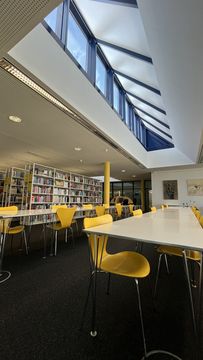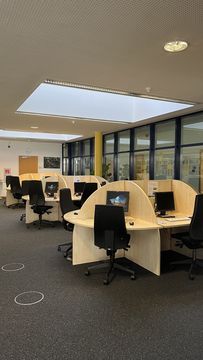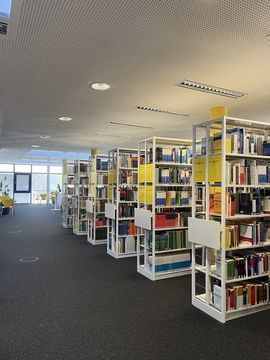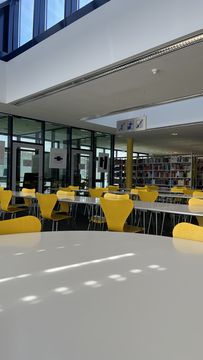In X-Men, there’s a machine called Cerebro that the telepath Charles Xavier uses to help him connect with people all over the world and their thoughts. In a way, I find libraries similar to Cerebro, only one needs not be an X-Men to be able to use it and connect with others. Beyond Cerebro, libraries can feel like time machines, for they act as gateways to different eras through not only the stories and knowledge of humanity they contain, but sometimes also their unique architecture and atmosphere, letting you defy the limits of linear time and embed yourself into the past or future.
As a result, I have high regards for libraries and much enjoy spending time there or exploring new ones, whenever I get the chance. Over the years, I’ve picked up some tips for making the most of library visits in Germany, and I’m excited to share six of them with you now.
1. Suggest New Acquisitions (Neuerwerbungsvorschlag)
Ever wish your library had a specific book, journal, or even a film? I did. And I still do from time to time. If that’s also the case for you, I bet you’d be glad to know that most libraries allow you to submit a „Neuerwerbungsvorschlag“ i.e. a new acquisition suggestion. If there’s a title you’re dying to read or a resource that could help with your studies or projects, let the library know! Many libraries prioritize community input when expanding their collections. Look for a standard formular on their website or inquire about it from the library of which you’re a member. This helps me save hundreds of euros recently on books I need for my Masters thesis. So, highly recommend!
2. Explore the Gemeinsamer Verbundkatalog (GVK)
The Gemeinsamer Verbundkatalog is a shared catalog used by libraries across Germany. Can’t find a book in your local library? Use the GVK to locate it in another library, and take advantage of interlibrary loan services—through which you can borrow a physical copy, or gain online access from the foreign library, via your home library. This tool opens up a world of possibilities beyond your local library’s walls.
3. Tap into Supraregional Libraries
Related to the tip above, I’d definititely recommend expanding your horizons beyond your own uni and city by exploring supraregional libraries like the for a wealth of resources regarding economic research, for comprehensive German literature, the for engineering and natural sciences, and the in Munich for a vast historical and cultural archive, to name but a few. These specialized libraries offer extensive collections and unique resources tailored to specific fields. If you’re conducting in-depth research, such libraries can provide invaluable support and access to materials you won’t find elsewhere.
Also, don’t be shy to ask your lecturers or fellow students where they find materials for their work, and take notes! I learned of the ZBW from a professor once and honestly couldn’t be more thankful for the tip.
. Get to Know Your Librarians
Librarians are living encyclopedias and the ultimate resource champions!
As I’ve said before: Don’t be afraid to reach out to people. Especially since librarians are there to help you find the information you need, recommend books, and even assist with specialized research. Ask for their help or advice—their knowledge could save you hours of searching and open your eyes to things you didn’t even know are possible. And trust me, most of them are super kind and ready to help 💛
5. Attend Workshops on Writing, Research and More
University libraries often host workshops to help with essential academic skills. Whether you’re struggling with citations, need help refining your research techniques, or want to improve your academic writing, these sessions are a fantastic way to learn from experts and level up your skills. Keep an eye on your library’s event calendar to stay in the loop.
Additionally, libraries nowadays extend their offers even beyond readings, e.g. the offer a wide variety of from concerts, crafting workshops, language courses, to even yoga.
6. Make the Most of the Offers
Many libraries provide free access to online journals, eBooks, audiobooks and databases. This is especially useful for students and researchers. Don’t forget to ask your librarian about how to access these digital resources from home—it’s a game-changer when working on papers or projects.
Furthermore, the concept of the Library of Things is becoming increasingly popular, so look out for such offers at your local libraries, in case you need tools that you otherwise don’t often use (e.g. electric drill, sewing machine, camping and sports equipments, etc.) or just want to try some things out.
Libraries are incredible hubs of learning and community. I hope these tips will help you unlock their full potential and maybe even discover a few new favorite resources along the way. Happy exploring!



